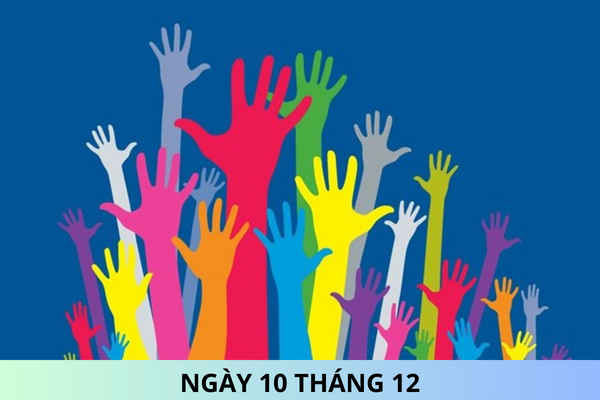What is the meaning of December 10? What is the lunar date of December 10, 2024?
What is the meaning of December 10? What is the lunar date of December 10, 2024?
On December 10, 1948, the United Nations General Assembly adopted the "Universal Declaration of Human Rights" and designated December 10 each year as World Human Rights Day.
Thus, December 10 is World Human Rights Day. According to the Perpetual Calendar, December 10, 2024, corresponds to the 10th day of the 11th month, 2024 in the lunar calendar.
The Universal Declaration of Human Rights consists of 30 brief and concise articles. Article 3 of the Declaration states: "Everyone has the right to life, liberty, and personal security," which is the foundation for the International Bill of Human Rights, including the two core conventions on human rights (the International Covenant on Civil and Political Rights and the International Covenant on Economic, Social and Cultural Rights) adopted by the UN in 1966.

What is the meaning of December 10? What is the lunar date of December 10, 2024? (Image from the Internet)
Do employees in Vietnam get a day off on December 10?
Based on Article 112 of the 2019 Labor Code regarding holiday:
Article 112. Holidays
- Employees are entitled to a day off from work and are paid full wages on the following holidays:
a) New Year's Day: 1 day (January 1 of the solar calendar);
b) Lunar New Year: 5 days;
c) Victory Day: 1 day (April 30 of the solar calendar);
d) International Labor Day: 1 day (May 1 of the solar calendar);
dd) National Day: 2 days (September 2 of the solar calendar and 1 adjacent day before or after);
e) Hung Kings' Commemoration Day: 1 day (the 10th day of the 3rd lunar month).
- Foreign employees in Vietnam, in addition to the holidays specified in clause 1 of this Article, are also entitled to 1 traditional Tet day of their ethnicity and 1 National Day of their country.
- Annually, based on actual conditions, the Prime Minister of the Government of Vietnam will decide the specific days off stipulated in point b and point dd, clause 1 of this Article.
According to the above regulations, employees will have days off from work and receive full wages during the aforementioned holidays:
- New Year's Day.
- Lunar New Year.
- Victory Day.
- International Labor Day.
- National Day.
- Hung Kings' Commemoration Day.
Thus, December 10, which is World Human Rights Day, is not a holiday for which employees get a day off. Therefore, on this day, employees must report to work if they are scheduled to work.
However, employees may take a day off on this day if they use their annual leave (as regulated in Article 113 of the 2019 Labor Code) or negotiate with their employers for unpaid leave (per clause 3 Article 115 of the 2019 Labor Code).
What are regulations on freedom according to the 1948 Universal Declaration of Human Rights?
Based on the 1948 Universal Declaration of Human Rights on freedom:
Article 2: Everyone is entitled to all the rights and freedoms set forth in this Declaration, without distinction of any kind, such as race, color, sex, language, religion, political or other opinions, national or social origin, property, birth, or other status.
Article 13:
-
Everyone has the right to freedom of movement and residence within the borders of each state.
-
Everyone has the right to leave any country, including his own, and to return to his country.
Article 18: Everyone has the right to freedom of thought, conscience, and religion; this right includes freedom to change one's religion or belief, and freedom, alone or in community with others, in public or private, to manifest one's religion or belief in teaching, practice, worship, and observance.
Article 19: Everyone has the right to freedom of opinion and expression; this right includes freedom to hold opinions without interference and to seek, receive, and impart information and ideas through any media and regardless of frontiers.
Article 20:
-
Everyone has the right to freedom of peaceful assembly and association.
-
No one may be compelled to belong to an association.
Article 27:
-
Everyone has the right freely to participate in the cultural life of the community, to enjoy the arts, and to share in scientific advancement and its benefits.
-
Everyone has the right to the protection of the moral and material interests resulting from any scientific, literary or artistic production of which he is the author.
Article 28: Everyone is entitled to a social and international order in which the rights and freedoms set forth in this Declaration can be fully realized.
Article 29:
-
Everyone has duties to the community in which alone the free and full development of his personality is possible.
-
In the exercise of his rights and freedoms, everyone shall be subject only to such limitations as are determined by law solely for the purpose of securing due recognition and respect for the rights and freedoms of others and of meeting the just requirements of morality, public order and the general welfare in a democratic society.
-
These rights and freedoms may in no case be exercised contrary to the purposes and principles of the United Nations.
Article 30: Nothing in this Declaration may be interpreted as implying for any state, group, or person any right to engage in any activity or to perform any act aimed at the destruction of any of the rights and freedoms set forth herein.










